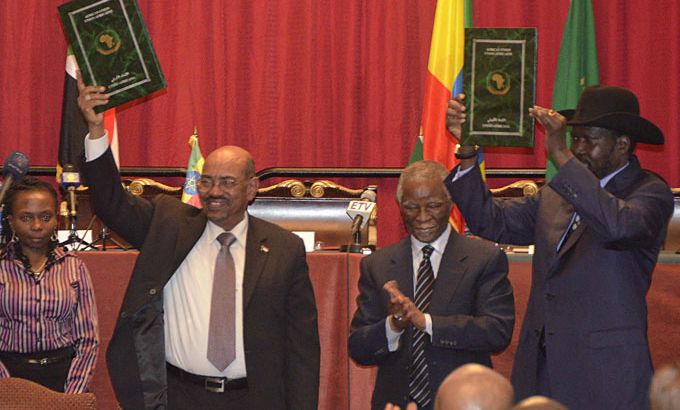
Will Sudan-South Sudan deal work this time?
As leaders agree on oil and border issues we ask if the partial deal can prevent renewed north-south armed conflict.
Leaders of Sudan and South Sudan have reached a deal to restart much-needed oil exports. The neighbours also agreed to create a demilitarised zone and what they described a ‘soft borders’ between them.
|
“One of the big questions will be how the sharing of oil is monitored…the international community has a big role to play in terms of some sort of oversight of how the oil is managed. A similar question is how the buffer zone along the very long border is going to be enforced.” – Jonathan Temin, from the United States Institute of Peace |
Salva Kiir, the president of South Sudan, said in Addis Ababa: “Even as we are celebrating the signing of this co-operation agreement that will be the basis for peace and stability of our two countries, there remain two fundamental issues that are still unresolved – the disputed, unclaimed areas plus the borders. It is my commitment…to engage Sudan under the facilitation of the AUHIP (African Union High-level Implementation Panel for Sudan) so that our borders are clearly demarcated.”
His Sudan counterpart, Omar al-Bashir, said: “I seize this historical opportunity and the journey toward building peace. We commenced years ago by culminating this comprehensive peace agreement which yielded in the referendum whereby we respected the choice of the people of the south and started by recognising the state South Sudan, and now we culminate our effort by signing the co-operation protocol and agreement…”
Under the deal:
- Troops must withdraw 10 kilometres from the unmarked border, however the contested issue of the Abyei border region remains unresolved
- South Sudan’s stalled oil production of 350,000 barrels a day should resume
- South Sudan will contribute to a fund for Sudan to compensate for losses in oil revenue
- But the most contentious issue involving the oil-rich region of Abyei remains unresolved
|
“Unless there is some real political resolution within Sudan between the regions that are currently in insurrection against Khartoum you’re not going to be able to get a secure border agreement… The international community [has failed to] realise that this is part of the problem.” – Douglas Johnson, an author and African history scholar |
The conflict in Abyei stems from a territorial dispute between two ethnic groups – the Dinka Ngok from South Sudan, and the northern nomads, the Misseriya.
Last week the African Union (AU) proposed holding a referendum to decide if Abyei belongs to the North or the South. But who will actually get to vote is still in question.
The AU says anyone with permanent residence should qualify, a point neither side can agree on.
So can this deal end the tension between Sudan and South Sudan?
Joining Inside Story with presenter Hazem Sika to discuss this are guests: Hafiz Mohammed, the director of Justice Africa and a former trade union leader in Sudan; Douglas Johnson, an author and scholar on the history of northeast Africa, Sudan and South Sudan, and was involved in the Abyei boundaries commission in 2005; and Jonathan Temin, the director of the Sudan and South Sudan programme at the United States Institute of Peace.
|
“There is a necessity for this agreement to work, a necessity to solve the problems between the north and the south because there is economic necessity, oil has to flow… [but] to be fully optimistic about political Sudan I think most of the time you get it wrong.” Hafiz Mohammed, the director of Justice Africa |
Key dates in Sudan-South Sudan ties:
- January 2005 – Khartoum signs a peace deal with rebels that includes agreements on power-sharing and a permanent ceasefire
- October – an autonomous government is formed in the south
- January 2011 – Sudanese in the south vote in favour of full independence from the north
- July – South Sudan gains independence
- January 2012 – South Sudan halts oil production over a conflict on fees with Sudan
- March – heavy fighting breaks out in the disputed oil-rich zone of Heglig. South Sudan’s President Salva Kiir later accuses the north of having “declared war” on his country